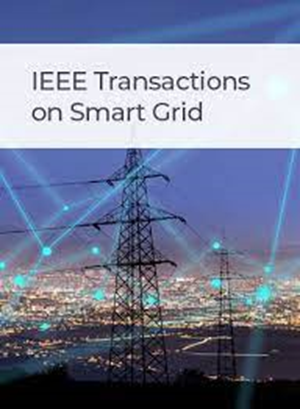Plug and Play Detector Design for DC Microgrids With Unknown-Inputs-Based FDI Attack
IF 8.6
1区 工程技术
Q1 ENGINEERING, ELECTRICAL & ELECTRONIC
引用次数: 0
Abstract
DC microgrids, due to their deep integration of control, computing, communication technologies, and physical equipment, are susceptible to cyber-attacks. Consequently, this paper is dedicated to the development of a novel attack-defense framework for generalized DC microgrids. Firstly, an unknown-inputs-based false data injection (FDI) attack strategy is studied from the adversary’s perspective, unlike traditional stealthy attacks requiring non-minimum phase zeros or unstable poles, which conceals the attack signal as false unknown inputs (FUI) to maliciously disrupt current sharing and voltage balancing. Secondly, a comprehensive analysis of the stealthiness and destructiveness of FUI attack is provided, and a dual-observer-based detector is well constructed to detect the FUI attack and isolate the compromised distributed generation units. Then, structured Lyapunov matrix and semidefinite programming are ingeniously employed to solve the distributed observer gains simultaneously. Moreover, plug and play (PnP) performance is also analyzed to ensure the scalability of proposed FUI attack detector. Finally, the destructiveness and stealthiness of proposed FUI attack, as well as the effectiveness of designed detection scheme are demonstrated through simulations using MATLAB/SimPowerSystems Toolbox.基于未知输入FDI攻击的直流微电网即插即用检测器设计
直流微电网由于其控制、计算、通信技术和物理设备的深度集成,容易受到网络攻击。因此,本文致力于为广义直流微电网开发一种新的攻击防御框架。首先,从对手的角度研究了一种基于未知输入的假数据注入(FDI)攻击策略,与传统的需要非最小相位零或不稳定极点的隐身攻击不同,它将攻击信号隐藏为假未知输入(FUI),恶意破坏电流共享和电压平衡。其次,全面分析了FUI攻击的隐身性和破坏性,构造了一种基于双观测器的检测FUI攻击并隔离受损分布式发电机组的检测器。然后巧妙地采用结构化李雅普诺夫矩阵和半定规划方法同时求解分布式观测器增益。此外,还分析了即插即用(PnP)性能,以确保所提出的FUI攻击检测器的可扩展性。最后,利用MATLAB/SimPowerSystems工具箱进行仿真,验证了所提出的FUI攻击的破坏性和隐蔽性,以及所设计检测方案的有效性。
本文章由计算机程序翻译,如有差异,请以英文原文为准。
求助全文
约1分钟内获得全文
求助全文
来源期刊

IEEE Transactions on Smart Grid
ENGINEERING, ELECTRICAL & ELECTRONIC-
CiteScore
22.10
自引率
9.40%
发文量
526
审稿时长
6 months
期刊介绍:
The IEEE Transactions on Smart Grid is a multidisciplinary journal that focuses on research and development in the field of smart grid technology. It covers various aspects of the smart grid, including energy networks, prosumers (consumers who also produce energy), electric transportation, distributed energy resources, and communications. The journal also addresses the integration of microgrids and active distribution networks with transmission systems. It publishes original research on smart grid theories and principles, including technologies and systems for demand response, Advance Metering Infrastructure, cyber-physical systems, multi-energy systems, transactive energy, data analytics, and electric vehicle integration. Additionally, the journal considers surveys of existing work on the smart grid that propose new perspectives on the history and future of intelligent and active grids.
 求助内容:
求助内容: 应助结果提醒方式:
应助结果提醒方式:


